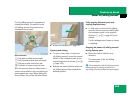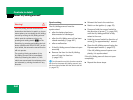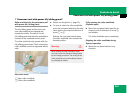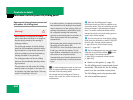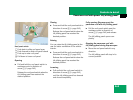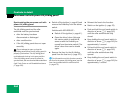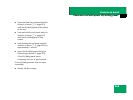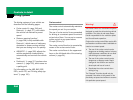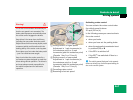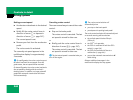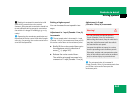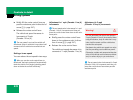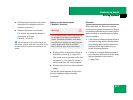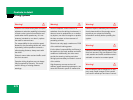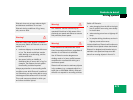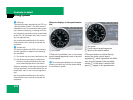
267
Controls in detail
Driving systems
1 Setting current or higher speed
Adjustment in 1 mph increments (to
the resistance point) or 5 mph
increments (past the resistance point)
(Canada: 1 km/h or 10 km/h)
2 Setting current or lower speed
Adjustment in 1 mph increments (to
the resistance point) or 5 mph
increments (past the resistance point)
(Canada: 1 km/h or 10 km/h)
3 Canceling cruise control
4 Resuming to last set speed
Activating cruise control
You can activate the cruise control when
the vehicle speed is above
20 mph (30 km/h).
In the following cases you cannot activate
the cruise control:
ț when you brake
ț when you have set the parking brake
ț when the automatic transmission is set
to position P, R, or N
ț if the ESP
®
is switched off
ț if the ESP
®
has switched off due to a
malfunction
Warning! G
The cruise control brakes automatically so
that the set speed is not exceeded. The
brake pedal depresses automatically when
the cruise control engages the brakes.
Keep driver’s foot area clear at all times,
including the area under the brake pedal.
Objects stored in this area may impair pedal
movement which could interfere with the
braking ability of the cruise control system.
Do not place your foot under the brake pedal
– your foot could become caught.
Keep in mind that the cruise control is a
convenience system designed to assist the
driver during vehicle operation. The driver is
and must always remain responsible for
the vehicle’s speed and for safe brake
operation.
i
The vehicle speed displayed in the speedo-
meter can briefly vary from the speed setting for
the cruise control system.



